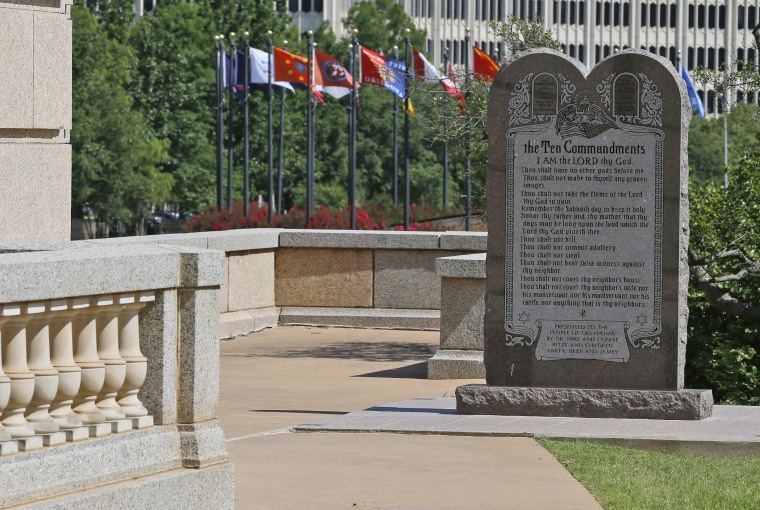For Oklahomans who want to merge church and state, the state Constitution is a stubborn obstacle. Section II-5 of the Oklahoma Constitution, for example, says public funds or property can't be used to benefit or support any "sect, church, denomination, or system of religion," either directly or indirectly. There's no real wiggle room.
And so, when Oklahoma lawmakers endorsed a monument to the Protestant version of the Ten Commandments, and placed the monument on state Capitol grounds, they probably knew they were playing fast and loose with the law. Indeed, no one should have been surprised last week when the state Supreme Court, in a 7-2 ruling, said the government-endorsed Christian monument is legally impermissible.
There was, of course, predicable apoplexy. Oklahoma's Republican state House Speaker said impeachment proceedings against the court's majority "will be seriously considered." Others called for changing the state Constitution so that the government would no longer have to be neutral on matters of religion.
While conservatives consider their options, there's still the matter of the state-endorsed Commandments display. It could be moved to private property -- one assumes a local church, for example, would welcome it -- but as the Washington Post reports, Oklahoma's governor has a different approach in mind.
Oklahoma Gov. Mary Fallin (R) said that the state's controversial Ten Commandments statue is staying put despite a state Supreme Court ruling ordering it to be taken off the statehouse grounds. [...] In statements issued Tuesday, Fallin defended the statue and said that "the court got it wrong." She added that the statue will remain in place while the state appeals the court's decision and the legislature considers changes to the constitution.
"Oklahoma is a state where we respect the rule of law, and we will not ignore the state courts or their decisions," Fallin's statement said. "However, we are also a state with three co-equal branches of government."
As a rule, when a politician says "we respect the rule of law," and then adds the word "however," there's a problem.
Appealing the case, for example, seems like an odd strategy since there are no more appeals -- the state Supreme Court is the highest court in Oklahoma. The state's attorney general has requested a "rehearing," though it's hard to see how that might work. The appeal effectively asks the state Supreme Court justices, "Remember that case you decided last week? Any chance you might want to take another look?"
In likelihood, no one actually expects this to work, but the goal is to buy time -- Fallin and her allies want to ignore the court's ruling as long as possible, so any pretense will do.
Legislators, meanwhile, are reportedly working on a plan to change the state Constitution. Republican state Rep. John Paul Jordan said in a statement yesterday, "After reviewing the Supreme Court's 10 Commandments ruling, it is clear that we have a toxic provision in our state Constitution. It was written with discrimination in mind, and like a malignant tumor, needs to be removed completely."
In the meantime, a six-foot-high, stone religious statue, already deemed unconstitutional, will continue to sit in front of the state Capitol, as if last week's court ruling doesn't exist.
The ACLU of Oklahoma, which helped bring the original suit, doesn't seem satisfied with state officials ignoring, at least for now, a Supreme Court ruling.
A spokesperson for the group told the Washington Post, "We along with no doubt a large number of Oklahomans were astonished at the governor's reaction and the statement today pretending that she has the authority to enforce the laws of some hypothetical future instead of enforcing the laws as they are today, Governors do not get a blank check to make up the laws as they see fit.... That's not the way that our democracy works and the governor's statement is unprecedented."
